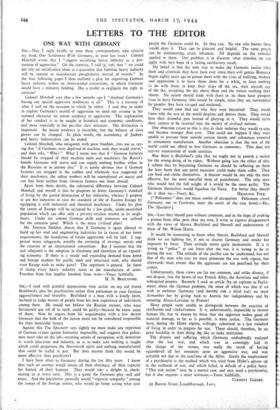ONE WAY WITH GERMANY
LETTERS TO THE EDITOR
SIR,—May I reply briefly to your three correspondents who criticise my book, Our Settlement With Germany, in your last issue? Colonel Minshall writes that I " suggest socialising heavy industry as a pre- vention of aggression." On the contrary, I said (p. 126) that " we could not rely on socialisation alone as a guarantee that German heavy industry will be content to manufacture ploughshares instead of swords." In the four following pages I then outlined a plan for organising German heavy industry within an international consortium, in which Germans would have a minority holding. Has a reader so negligent the right to criticise?
Colonel Minshall says that a few months ago I " doubted Germany's having any special aggressive tendencies at all." This is a travesty of what I said on the occasion to which he refers. I said that in order to explain Germany's record of aggression we need not assume in her national character an innate tendency to aggression. The explanation of her conduct is to be sought in historical and economic conditions, and more especially in her pe.'iliar class structure. The distinction is important. An innate tendency is incurable, but the balance of class power can be changed. In plain words, the ascendancy of Junkers and heavy industrialists can be ended.
Colonel Minshall, who misquotes with great freedom, cites me as say- ing that " if Germans were deprived of machine tools they would starve," and then asks, " Why? " What I wrote was that if German factories should be stripped of their machine tools and machinery for Russia's benefit Germans will starve and can supply nothing further either to the Russians or to anyone else." It is surely obvious that if German factories are stripped in the sudden and wholesale way suggested of their machinery, the urban workers will be unemployed en masse and can buy food neither from German farmers nor from abroad.
Apart from these details, the substantial difference between Colonel Minshall and myself is that he proposes to lower Germany's standard of living by the partial destruction of her industries, whereas I propose to use her industries to raise the standard of life of Eastern Europe by equipping it with industrial and electrical machinery. Under his plan the centre of Europe will be occupied by a low-grade, under-nourished population which can offer only a poverty-stricken market to its neigh- bours. Under my scheme German skills and resources are utilised for the common good. Which is the more civilised plan?
Mr. Norman Sheldon objects that if Germany is again allowed to build up her steel and engineering industries far in excess of her home requirements, the foundation of future aggression will be laid.. I sug- gested many safeguards, notably the rationing of strategic metals and the creation of an international consortium. But I insisted that the teal safeguard is the adoption in Germany and elsewhere of an expand- ing economy. If there is a steady and expanding demand from home and foreign markets for pacific tools and structural steel, why should even Krupp wish to make guns? The argument is general. In times of slump every heavy industry turns to the manufacture of arms. Freedom from fear implies freedom from want —Yours faithfully, H. N. BRAIL.SFORD.


























 Previous page
Previous page